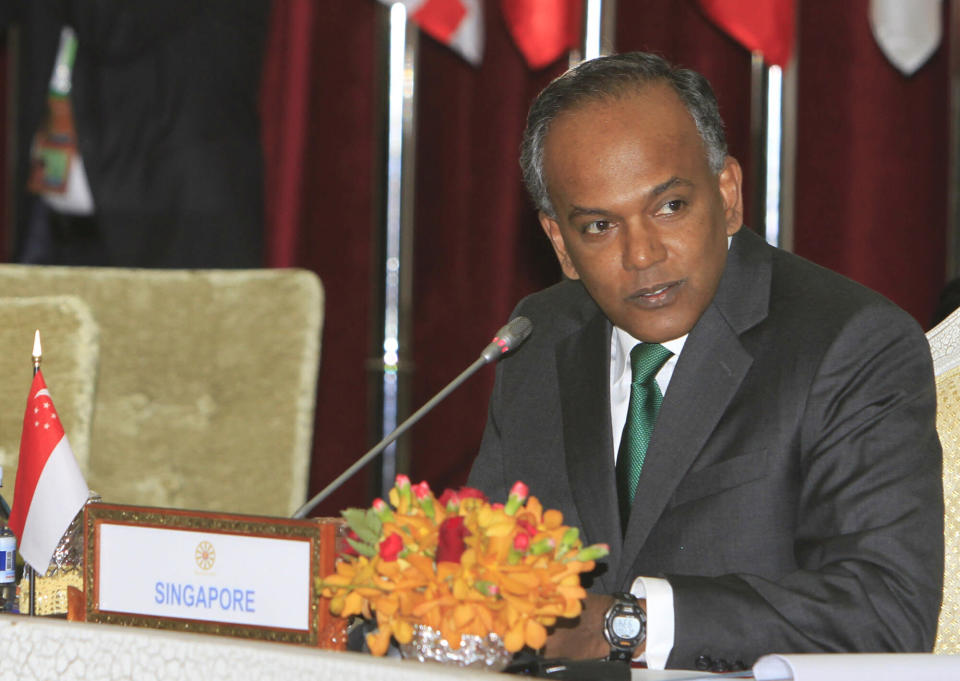Shanmugam: 'Not tenable' to make exceptions on executions of Malaysian drug traffickers

SINGAPORE — It is “not tenable” to make exceptions and stop the executions of Malaysian drug traffickers, as it would undermine the rule of law in Singapore, said Law and Home Affairs Minister K Shanmugam on Friday (24 May).
Speaking at a Central Narcotics Bureau event, Shanmugam said the Singapore government had received three requests from Malaysia’s Pakatan Harapan (PH) government to stop the executions of Malaysians in Singapore since PH came into power last year, according to media reports. Two of them involved drug traffickers, he added.
"Let me be quite clear, it's not possible for us to do so, regardless of how many requests we receive," he said.
“It's not tenable to give a special moratorium to Malaysians, and impose (the punishment) on everyone else, including Singaporeans who commit offences which can bring the death penalty."
Some members of the PH coalition party are “ideologically opposed” to the death penalty, said Shanmugam, according to CNA.
“We have to respect their position. At the same time, we do impose a death penalty in Singapore, and I expect that Malaysia will respect that position as well,” he added.
Letter of appeal from Malaysia law minister
Malaysia’s Law Minister Liew Vui Keong had written a letter to appeal on behalf of drug mule Pannir Selvam Pranthaman, who is on death row in Singapore, the Malay Mail reported on Friday.
Pannir was caught trafficking more than 51 grams of heroin at the Woodlands Checkpoint in 2014. The heroin trafficking threshold for the death penalty in Singapore is 15 grams.
The 31-year-old Malaysian was due to be executed at dawn on Friday, but the Court of Appeal in Singapore granted a stay of execution on Thursday.
He had applied for his death sentence to be stayed, on the basis that he intends to mount a legal challenge against the rejection of his petition for clemency to President Halimah Yacob.
A three-judge panel granted his request, noting that Pannir was told of the rejection and his execution date just one week in advance, leaving him without much time to obtain legal advice on what options he has to challenge the rejection of his clemency plea.
Shanmugam said Pannir had been given due process at every stage.
Singaporeans ‘supportive of death penalty’
Singapore's population is supportive of the death penalty, and it is imposed because it is an "effective deterrent" against drug offences, said Shanmugam, according to The Straits Times.
He revealed that almost 30 per cent of drug traffickers caught in Singapore last year were Malaysians, and nearly 30 per cent of the heroin seized here was brought in by Malaysians. One in five traffickers who brought in drugs above the threshold that brings the death penalty were also Malaysians.
He said, "How can we go easy on Malaysians in the face of these statistics? And if we did, what would it mean for the rule of law? It would become a joke. Because there's a request made, we release him? That's not the way Singapore works.”
Three suggestions to tackle drug trafficking problem
Shanmugam said that he will respond to Liew once Pannir’s case is over, and will make three suggestions to get to the root of the drug trafficking problem across the Causeway, according to Today Online.
First, he will request for statistics on how many drug traffickers the Malaysian authorities pick up on their side of the border.
"If they can make sure they arrest the traffickers, before they come into Singapore, that helps them and it helps us,” he said. “The traffickers do not have to face the death penalty – they can keep them in Malaysia."
The second suggestion would be that Malaysia should arrest the drug kingpins who are operating there and “who are too scared to come into Singapore”.
Shanmugam added that the third suggestion will be to urge Malaysia to publicise Singapore’s tough drug laws to potential drug trafficking groups.
The offenders are predominantly poor, less-educated, and Indian, and are willing commit drug crimes in Singapore for a few hundred Malaysian ringgit, he said.
“If we worry about lives, both Governments, and we do, then I would suggest that these are concrete, practical steps that can be taken. It is simply not doable to keep asking Singapore not to carry out the penalties imposed by the Courts," he added.
Other Singapore stories:
Woman allegedly involved in $5.4M gold investment scam charged
Primary One registration for 2020 to take place from 3 July to 31 October
Drop in latest COE prices, with premiums of smaller cars falling sharply


